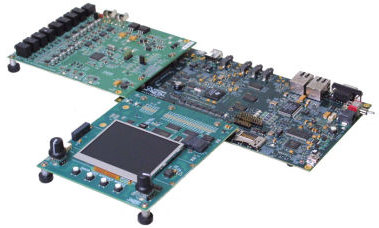TI adds ARM9, Linux to sound chip
Dec 15, 2008 — by Eric Brown — from the LinuxDevices Archive — 8 views [Updated: 1PM] — Texas Instruments (TI) is shipping a third-generation “Aureus” digital audio processor platform with a Linux software developer's kit (SDK). Available with an evaluation module (pictured) from Spectrum Digital, the DA830 and DA828 system-on-chips (SoCs) combine ARM9 cores with digital signal… processors (DSPs).
[Updated: 1PM] — Texas Instruments (TI) is shipping a third-generation “Aureus” digital audio processor platform with a Linux software developer's kit (SDK). Available with an evaluation module (pictured) from Spectrum Digital, the DA830 and DA828 system-on-chips (SoCs) combine ARM9 cores with digital signal… processors (DSPs).
Both the DA830 and lower-cost DA828 target network-connected audio/video receivers, home theater in-a-box, and mini/micro component systems, says TI. Specific applications are said to include remote access to digital music and streaming Internet radio, with support for features including “smart volume” and room correction.
Unlike TI's previous DA7x generation of DSPs, the DA8x SoCs add a programmable ARM9 core supported by a Linux distribution, opening up more possibilities for application development, says TI. Both DA8x SoCs combine a TMS320C674x 64-bit floating/fixed point audio DSP engine clocked at 300MHz, along with a 300MHz ARM926EJ-S core. Both DA8x versions offer 384KB DSP RAM and 1MB DSP ROM, with the ARM9 core offering 32KB/32KB L1 and 256KB L2 cache. All of these capacities are higher than those offered by the DA7x SoCs, which used older C67x DSPs.
Additional DA8x features include an Ethernet MAC, two USB ports, an SD/MMC interface, PWM processors, and an LCD controller, says the company. The integrated components are said to lower costs by eliminating multiple system components, while also reducing PCB board space.
The two SoCs differ in that the lower-end DA828 offers only one full-speed Host/Dev USB 2.0 interface while the DA830 offers both a high-speed OTG USB 2.0 interface and a full-speed USB 1.1 Host. Other differences include the DA828's lack of support for HPI, as well as its lower-powered LCD controller (8-bit instead of 16-bit).
The DA8x line is “significantly more powerful” than its earlier DA7x SoCs, claims TI. Touted improvements include a 20 percent performance boost and a 25 percent code size reduction for lossless HD decoders. Each DA8x device is claimed to run DTS-HD and Dolby TrueHD 7.1 channel decoders at a sample rate of 192kHz. Meanwhile, performance headroom and memory are said to be available for OEMs to implement differentiating post-processing algorithms.
AVR SDK includes Linux
TI says that both algorithms and applications can be developed using its networked AVR Software Developer's Kit (nAVR SDK), which includes a full Linux distribution to support the ARM926EJ-S core. The SDK offers an integrated Performance Audio Framework (PAF) that includes multi-channel decoding and post-processing algorithms for HD audio decoders, Dolby TrueHD, Dolby Digital Plus, and DTS-HD, says TI.
The DA830 and DA828 also offer TI's Linux-ready Code Composer Studio (CCStudio) integrated development environment (IDE), and are said to be compatible with DA8x-specific MontaVista Linux tools. Potential applications include Internet radio and DLNA/uPNP functionality.
The DA8x PAF is software compatible with previous Aureus devices, so that differentiated post-processing algorithms are “fully re-usable,” claims TI. Third party support for Aureus devices is said to be provided by Audyssey Laboratories, DiMagic, Dolby Laboratories, DTS, Expamedia, Neural Audio, QSound Labs, SRS Labs, and Trinnov Audio.

Spectrum Digital's DA830EVM-Kit
Spectrum Digital's EVM
Spectrum Digital is now selling a beta version of its DA830EVM-Kit for the DA830. The evaluation board (EVM) actually consists of three boards: a main DA830 DSK board, as well as a multi-channel audio board and an LCD “user interface” board that plug into it.
Specifications for the DA830EVM-Kit, which ships with a power supply, are said to include:
- DSK board:
- 512Mbit SDR DRAM
- 32Mbit SPI serial flash
- MMC/SD interface
- UART
- AIC3106 stereo codec
- USB 1.1 and 2.0 interfaces
- 10/100 Ethernet controller
- On-board USB JTAG emulation
- Multi-channel audio board:
- AK4588 combo codec (DIR & 8ch DAC)
- PCM1802 ADCs
- Optical and coaxial S/PDIF inputs
- Coaxial S/PDIF output
- 8-channel analog I/O
- UI board:
- 3.5-inch color LCD
- 4Gbit NAND flash
- 32Mbit NOR flash
- Knobs and buttons
Availability
The DA830 is available for $19.44 at 100 units, says TI, which did not offer pricing or availability information on the DA828. Spectrum Digital's DA830EVM-Kit EVM board is available for $1,600. More information on the DA830 and DA828 may be found here. More on the EVM should be here.
This article was originally published on LinuxDevices.com and has been donated to the open source community by QuinStreet Inc. Please visit LinuxToday.com for up-to-date news and articles about Linux and open source.